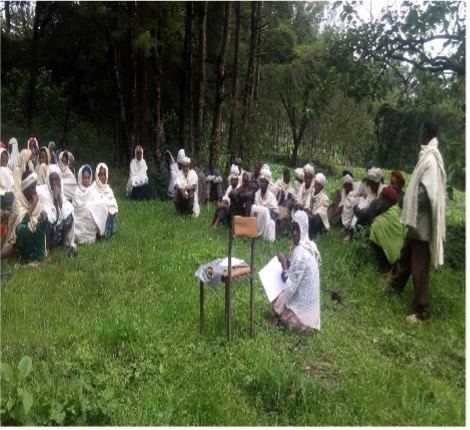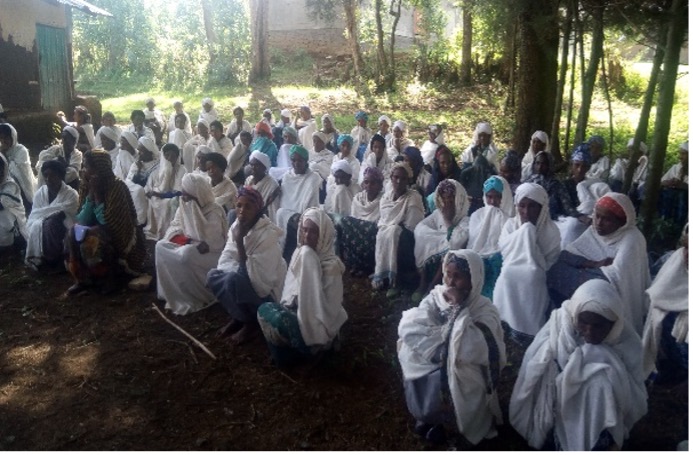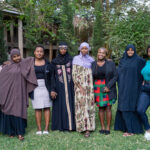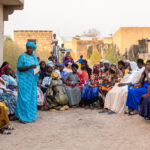The conflict in the Amhara region has heightened risks for women and girls, driving a surge in gender-based violence and challenging efforts to implement effective programs. This disruption limits marginalized groups, especially those affected by FGM/C, from accessing crucial support services.
To address these challenges, The Girl Generation collaborates with community-led organizations to design tailored interventions that meet the unique needs of those most impacted. By empowering local and grassroots groups, The Girl Generation delivers sustainable solutions that address urgent community needs while building long-term resilience.
Female Genital Mutilation/Cutting (FGM/C) is a deeply entrenched cultural practice with approximately 65.2% of women aged 15-49 in Ethiopia having experienced it as reported by the country’s 2016 Demographic and Health Survey (DHS).
Mahilbere Hiwot for Social Development (MSD) and Addis Hiwot Rehabilitation and Reintegration Association (AHRRA), anchor and medium grantee partners respectively, of The Girl Generation stand out as key players in ending FGM/C in the Amhara region.
Community-Led Movements in Ending FGM/C
MSD, active in 14 villages, leverages Ethiopia’s Women Development Army (WDA) initiative to reach vulnerable women and girls aged 10-20. The Women Development Army being a government initiative, has members in every Kebele (ward). MSD has drawn 30 women facilitators from each Kebele they operate in to raise awareness of the negative effects of FGM/C. The facilitators, oftentimes university students serve not just as educators but as role models to the girls. “Having facilitators from the same Kebele ensures that young girls have someone to look up to,” explains Teddy. “This approach ensures knowledge and skills are cascaded to the younger generations.”

Part of the mandate of the anchor grantee is to support the capacity strengthening of the medium and small grantees in their geographical location. MSD has been able to address the organizational gaps among the small and medium grantee partners by training them in financial management, bookkeeping, and organisational structure. “We realized that many organizations lacked foundational policies. Strengthening their capacity ensures long-term impact,” Teddy Kassa, MSD program coordinator shared.
MSD incorporates anti-FGM/C activism within cultural and healthcare frameworks by collaborating with the Women Development Army and religious leaders. Priests too have played a significant role in promoting the end FGM/C campaign during significant ceremonies like baptisms.
Baptism ceremonies are usually held seven days after birth, by priests, who are considered spiritual fathers. During these ceremonies, priests advise mothers not to subject their daughters to FGM/C. Mothers who disregard this advice run the risk of being shunned as the priest may opt not to continue as her family’s spiritual leader.
The Women Development Army amplified these messages, directly intervening to prevent cases, including one notable success where a worker persuaded a mother who had travelled from Addis to Amhara to subject her daughter to FGM/C.
Innovative Family-Centric Advocacy in ending FGM/C
In the Amhara region, where FGM/C prevalence stands at 62.5% (DHS 2016), AHRRA’s innovative Model Family approach is reshaping perceptions. Operating in the Kebeles of Jara, Worke, Gena, and Marinte, AHRRA identifies families who reject FGM/C, are respected in their communities, and have the ability to educate others. These families voluntarily serve as advocates, demonstrating that it is not only attainable but also desirable for the community to end FGM/C.
According to Ahmed, AHRRA program coordinator, “This approach resonates with the community because it is grounded in trust and shared values. People are more inclined to pay attention to someone they respect and know.”
The successes of AHRRA and MSD demonstrate the power of community-driven and locally led strategies. According to UNICEF, the prevalence of FGM/C might drop to less than 30% by 2030 if the issue is consistently addressed at the grassroots level throughout the country.
We believe that grassroots organisations have the local connections, insight, and influence to tackle the social norms that underpin Female Genital Mutilation/Cut (FGM/C). However, these organisations are often too small to be eligible for grants from a majority of donors. The Girl Generation: Support to Africa-led Movement to End FGM/C created the End FGM/C grassroots grants to respond to these challenges.
The vision of the small grants’ mechanism is to strengthen the Africa-led movement to end FGM/C by resourcing and supporting those most affected by FGM/C and other forms of gender-based violence against women and girls at the grassroots to lead change within their communities, countries, and globally.



